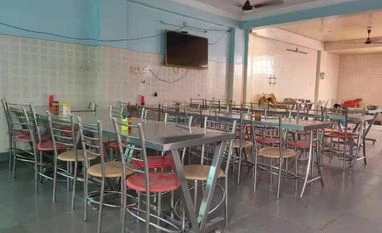On a humid Sunday afternoon, the roads of Indira Vihar, a posh residential colony in the coaching hub of Kota, were overrun by a sea of green-clad aspirants converging to take an institute exam.
This familiar sight in the city, however, belied the challenges that its coaching ecosystem is facing currently.
Over 200,000 aspirants, primarily from classes XI and XII, flock to the nerve centre of competitive coaching each year to prepare for premier engineering and medical entrance examinations.
But, this year has witnessed an unexpected decline in student enrolments in Kota’s coaching institutes, affecting the entire ecosystem thriving around them – a Rs 5,000 crore industry.
According to estimates by people familiar with the churn, there has been a 30-40 per cent drop in enrolments compared to last year. Teachers at various institutes point to several reasons for this decline, including the emergence of new centres closer to students’ homes, helping reduce the “psychological pressure” of relocating to Kota. “Several institutes have opened new centres in other cities across Rajasthan, Bihar, and Uttar Pradesh,” a faculty member from one of Kota’s largest coaching institutes explained.
“Parents are opting to keep their children closer to home amid concerns over student suicides in Kota. Furthermore, aspirants now can save on migration expenses, helping reduce the financial burden on their parents.”
A spokesperson for Physics Wallah echoed the sentiment, emphasising the edtech company’s strategy to ease pressure on established education hubs, such as Kota, and open multiple centres in states like Uttar Pradesh, Bihar, Maharashtra, Madhya Pradesh, and Rajasthan. “We have doubled our admission numbers in these centres by bringing quality education to students’ doorsteps, thereby improving their emotional and psychological well-being,” the spokesperson stated.
The drop in student enrolments has precipitated a domino effect, impacting everyone, from teachers and hostel owners to bookshops and street vendors. According to some faculty members, Allen Career Institute, Kota’s largest coaching institute, has reduced fixed wages for its over 4,000 faculty and administrative staff by 20-40 per cent following a 35-40 per cent decrease in enrolments.
Physics Wallah has begun reassigning teachers to its new centres outside Kota.
Queries emailed to Allen remained unanswered until the time of going to press.
The economic slowdown is palpable in Indira Vihar. Pointing to empty chairs at Shri Gorakhnath Mess and Tiffin Service, its owner Rinku Jain lamented: “We’ve seen a 50 per cent loss in business due to the drop in student admissions. Last year, we served 300 students daily; now, it’s barely 150.” This decline has forced many small messes in the area to close, he said.
In Jawahar Nagar and Coral Park, the situation is even worse. Ravindra Nagpal, a local, shared the plight of his brother-in-law who runs a bookshop in Jawahar Nagar: “Business has dropped so significantly that he’s had to dip into his personal savings to pay his workers.”
As coaching admissions in Kota traditionally run from December to June, local businesses are bracing for a tough year, with little hope for an uptick in numbers. The sharpest decline, a resident said, has been among students from Bihar and Jharkhand, traditionally a substantial segment of Kota’s aspirant pool. “The NEET UG paper leak controversy has shook students’ confidence, worsening the situation.”
Hostel owners are grappling with vacant rooms and falling rents. Pankaj Jain, secretary general of the Kota Hostel Association, reported a 20-30 per cent drop in rents. The association has been at the forefront to address issues between owners and leaseholders, who run the hostels.
Leaseholders paid exorbitant sums to take over hostels but are not getting enough aspirants to fill them.
After the Covid pandemic, there was a surge in enrolments due to backlogs, but now the numbers have regressed to pre-pandemic levels, a hostel owner said. “We saw new enrolments soar to 300,000 in 2022, but this year it’s around 200,000 to 220,000. Before the pandemic, annual numbers hovered between 200,000 and 250,000.”
A shopkeeper in Jawahar Nagar summed up the multifaceted challenges: “During the pandemic, our only issue was Covid-19. Now we’re facing competition from regional centres, age-related government regulations for coaching institutes (they cannot enrol students below 16 years), and the negative image from student suicides.”
Despite the worries caused by the proliferation of new centres in other states, many in Kota’s coaching ecosystem remain hopeful. For some like Shantanu from Odisha’s Mayurbhanj district, the lure of Kota’s “unmatched” teaching quality remains irresistible. When asked had he preferred a coaching centre to home, he simply replied: “I have not thought about it.”
Many like Shantanu believe that the superior quality of coaching institutions in Kota and their proven results will eventually bring the numbers back up next year.
Unlock 30+ premium stories daily hand-picked by our editors, across devices on browser and app.
Pick your 5 favourite companies, get a daily email with all news updates on them.
Full access to our intuitive epaper - clip, save, share articles from any device; newspaper archives from 2006.
Preferential invites to Business Standard events.
Curated newsletters on markets, personal finance, policy & politics, start-ups, technology, and more.
)